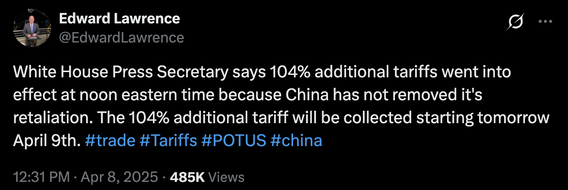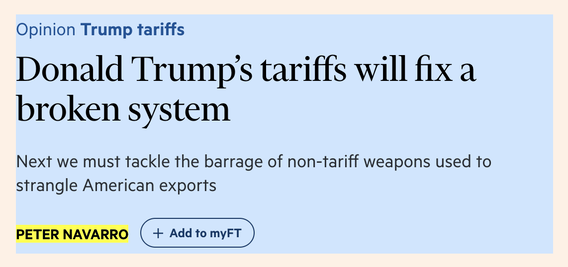https://twitter-thread.com/t/1909645258729594976
"White House Press Secretary says 104% additional tariffs went into effect at noon eastern time because China has not removed it's retaliation. The 104% additional tariff will be collected starting tomorrow April 9th." ( https://www.mitrade.com/insights/news/live-news/article-6-747403-20250409 )
"White House Press Secretary says 104% additional tariffs went into effect at noon eastern time because China has not removed it's retaliation. The 104% additional tariff will be collected starting tomorrow April 9th." ( https://www.mitrade.com/insights/news/live-news/article-6-747403-20250409 )
https://www.ft.com/content/f313eea9-bd4f-4866-8123-a850938163be
Let's straighten the frame here, because while the rhetoric of "fairness" and "reciprocity" sounds appealing—especially when couched in moral outrage and national pride—it rests on a misreading of both how international trade works and how monetary sovereignty functions.
Let's start with the "national emergency" you mention: the trade deficit.
A trade deficit is not a financial drain. It's a real resource gain.
When the U.S. runs a trade deficit, it's importing more goods and services than it exports. That means we get real stuff—cars, electronics, steel, clothing—in exchange for digital dollars, which cost us nothing to produce. We're shipping out our currency, which the world uses as a safe savings vehicle, and bringing in valuable real goods that improve living standards.
If you framed this accurately, you'd say: the U.S. is running a trade surplus in dollars and a deficit in real goods. That is, we consume more than we produce because the rest of the world wants to save in our currency. And if they stop? Then we produce more here. The capacity is available. The unemployed and underemployed workers are available.
Now, about manufacturing job loss—yes, we lost millions of manufacturing jobs. But here's the truth: the bulk of those jobs were lost to automation and productivity increases, not foreign trade. We produce more in manufacturing than ever—we just do it with fewer people, because technology has advanced. You want to bring back those jobs? Then you're going to have to roll back technological progress. Good luck with that.
You also say America has been "transferring wealth" overseas via trade deficits. Again: the U.S. government cannot run out of dollars. It creates them. When foreigners take dollars in exchange for goods, they're not "stealing" from us—they're choosing to hold U.S. assets instead of consuming U.S. goods. That's their decision. And many of them recycle those dollars into Treasury securities—a voluntary savings account at the Fed.
And let's touch on tariffs. You argue that reciprocal tariffs are "fair." But let's be clear: tariffs are a tax on American consumers. They raise prices. They may shield some domestic industries temporarily, but the cost is borne by everyone else—especially working families. You can protect an industry with targeted fiscal policy, investment, and job guarantees. You don't need to tax imports and pretend it's patriotism.
What's more, if you're serious about restoring American manufacturing, you need a coherent industrial policy—not a blunt instrument like tariffs that treats every good and every nation the same. That means investing in education, infrastructure, clean energy, research and development. It means public employment where the private sector can't or won't do the job. Not swagger and retaliation masquerading as economic strategy.
Yes, non-tariff barriers exist. Yes, some countries cheat. And yes, multilateral institutions like the WTO have been insufficient. But the answer is not to blow up the system, but to use your power as the issuer of the world's reserve currency to negotiate from a position of strength. We don't need to mimic the worst behavior of others to assert our interests. We can lead with confidence, clarity, and public purpose.
In short:
- Trade deficits are not inherently bad.
- Tariffs are taxes on Americans.
- The U.S. is not financially constrained—it's policy-constrained.
- Industrial revival requires fiscal leadership, not tariff brinkmanship.
- Fairness doesn't come from mirroring harm, but from maximizing domestic prosperity.
If we really want to rebuild America, we don't need to make things worse for our own people to punish foreign nations. We need to use the full powers of our public institutions to mobilize resources, employ people, and serve the general welfare. That's not just fair—it's the foundation of liberty.
Let's straighten the frame here, because while the rhetoric of "fairness" and "reciprocity" sounds appealing—especially when couched in moral outrage and national pride—it rests on a misreading of both how international trade works and how monetary sovereignty functions.
Let's start with the "national emergency" you mention: the trade deficit.
A trade deficit is not a financial drain. It's a real resource gain.
When the U.S. runs a trade deficit, it's importing more goods and services than it exports. That means we get real stuff—cars, electronics, steel, clothing—in exchange for digital dollars, which cost us nothing to produce. We're shipping out our currency, which the world uses as a safe savings vehicle, and bringing in valuable real goods that improve living standards.
If you framed this accurately, you'd say: the U.S. is running a trade surplus in dollars and a deficit in real goods. That is, we consume more than we produce because the rest of the world wants to save in our currency. And if they stop? Then we produce more here. The capacity is available. The unemployed and underemployed workers are available.
Now, about manufacturing job loss—yes, we lost millions of manufacturing jobs. But here's the truth: the bulk of those jobs were lost to automation and productivity increases, not foreign trade. We produce more in manufacturing than ever—we just do it with fewer people, because technology has advanced. You want to bring back those jobs? Then you're going to have to roll back technological progress. Good luck with that.
You also say America has been "transferring wealth" overseas via trade deficits. Again: the U.S. government cannot run out of dollars. It creates them. When foreigners take dollars in exchange for goods, they're not "stealing" from us—they're choosing to hold U.S. assets instead of consuming U.S. goods. That's their decision. And many of them recycle those dollars into Treasury securities—a voluntary savings account at the Fed.
And let's touch on tariffs. You argue that reciprocal tariffs are "fair." But let's be clear: tariffs are a tax on American consumers. They raise prices. They may shield some domestic industries temporarily, but the cost is borne by everyone else—especially working families. You can protect an industry with targeted fiscal policy, investment, and job guarantees. You don't need to tax imports and pretend it's patriotism.
What's more, if you're serious about restoring American manufacturing, you need a coherent industrial policy—not a blunt instrument like tariffs that treats every good and every nation the same. That means investing in education, infrastructure, clean energy, research and development. It means public employment where the private sector can't or won't do the job. Not swagger and retaliation masquerading as economic strategy.
Yes, non-tariff barriers exist. Yes, some countries cheat. And yes, multilateral institutions like the WTO have been insufficient. But the answer is not to blow up the system, but to use your power as the issuer of the world's reserve currency to negotiate from a position of strength. We don't need to mimic the worst behavior of others to assert our interests. We can lead with confidence, clarity, and public purpose.
In short:
- Trade deficits are not inherently bad.
- Tariffs are taxes on Americans.
- The U.S. is not financially constrained—it's policy-constrained.
- Industrial revival requires fiscal leadership, not tariff brinkmanship.
- Fairness doesn't come from mirroring harm, but from maximizing domestic prosperity.
If we really want to rebuild America, we don't need to make things worse for our own people to punish foreign nations. We need to use the full powers of our public institutions to mobilize resources, employ people, and serve the general welfare. That's not just fair—it's the foundation of liberty.
Write a comment...
Sort by

